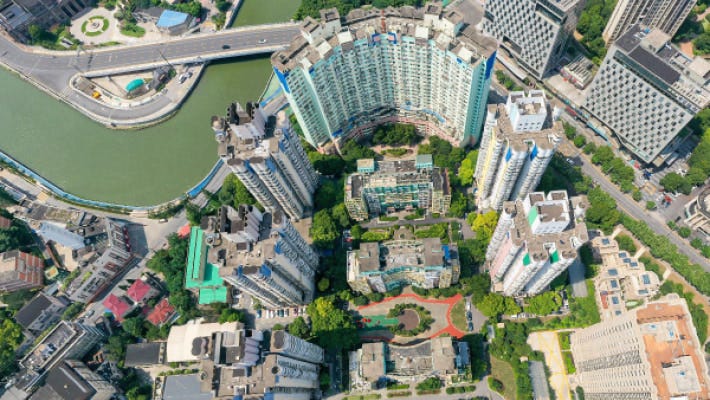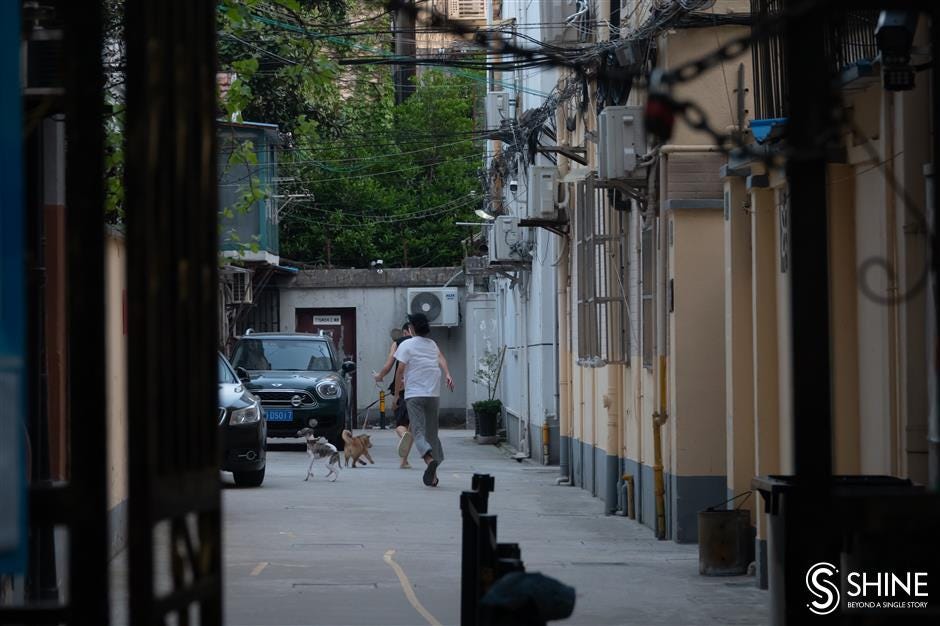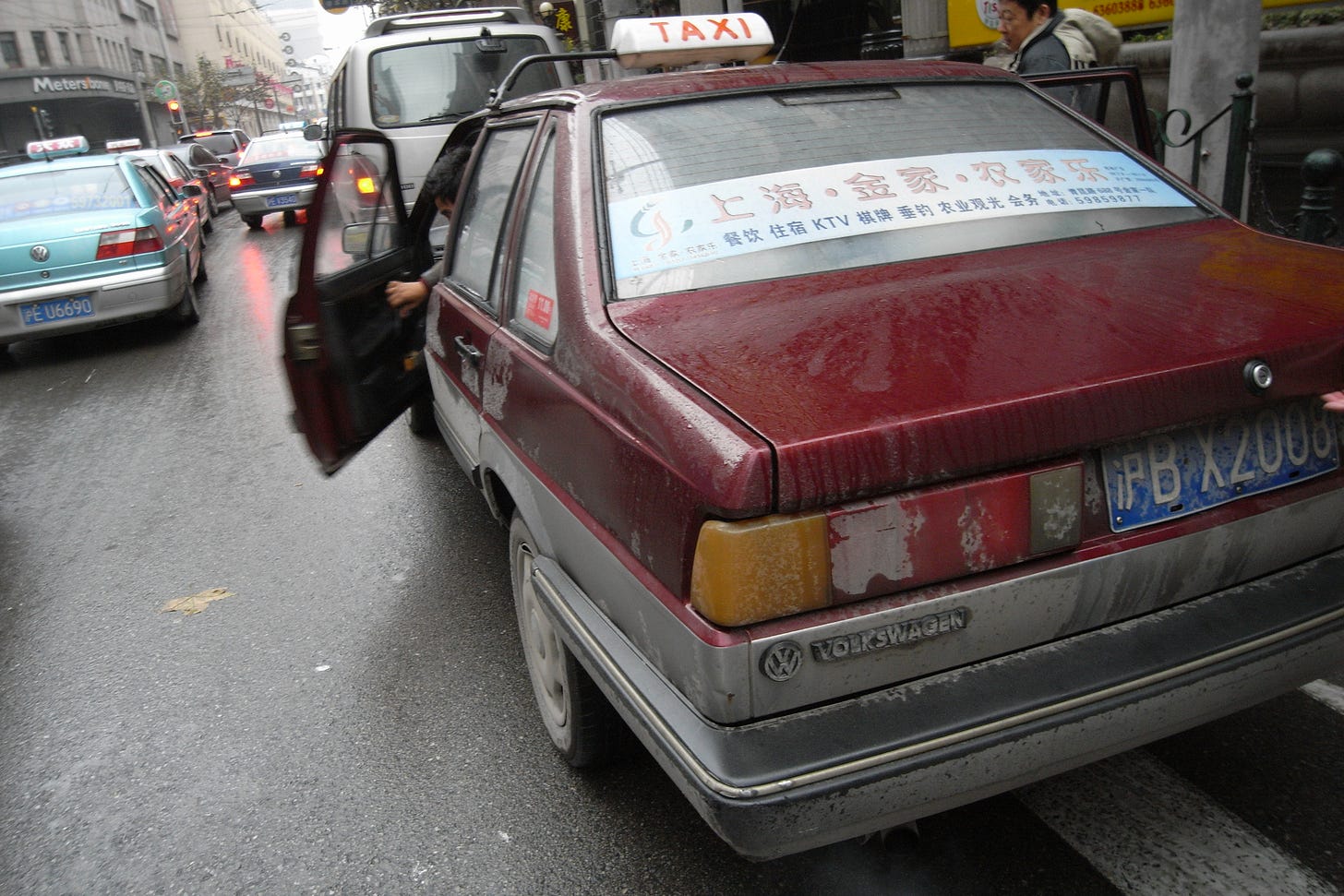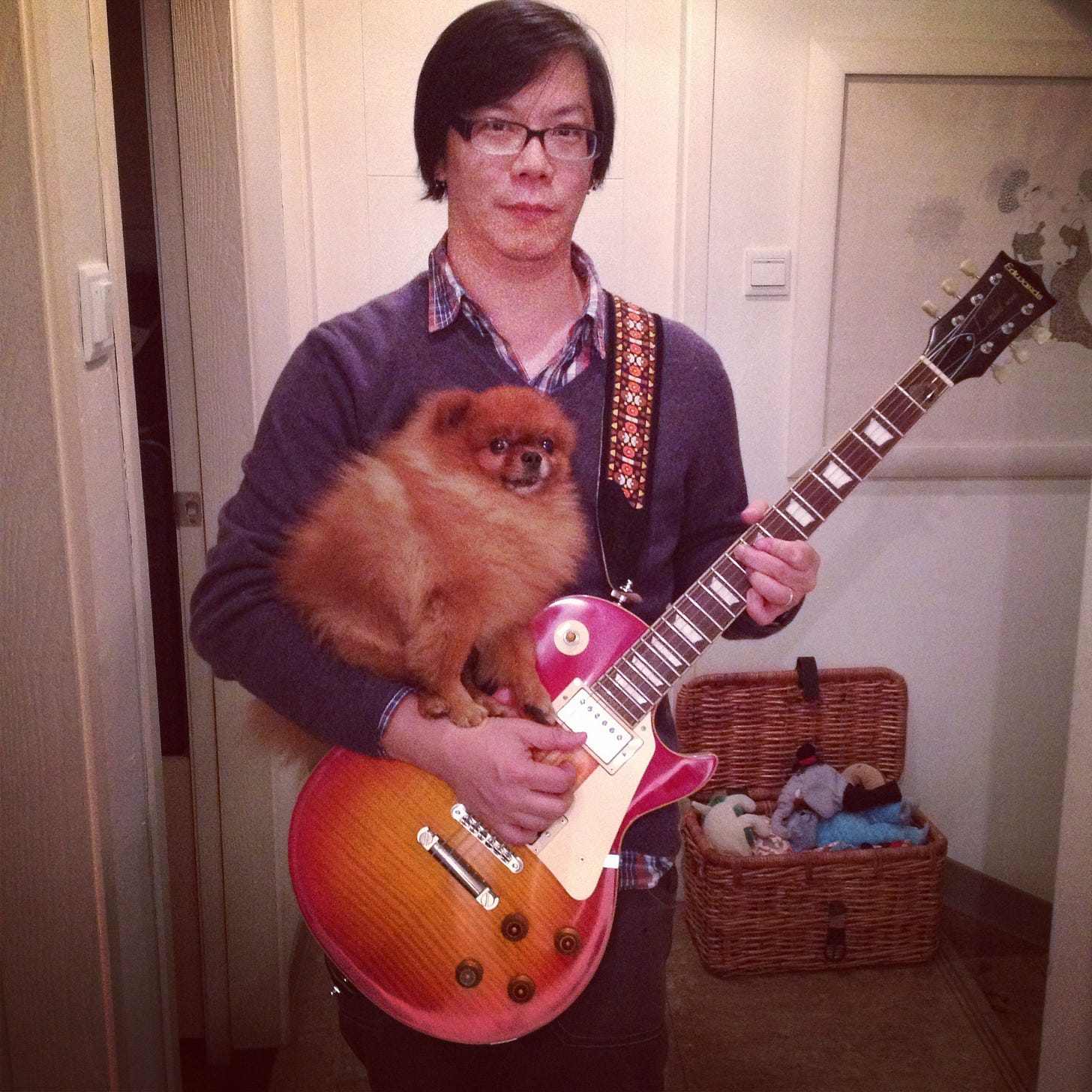Before we get back to our main story, a quick digression.
For the last few chapters I’ve been setting up characters and elements to the story of the Worst Producer in Shanghai, but one thing that’s been left by the wayside is my actual life in Shanghai. Remember that this was a huge life change for me, going from burned out grad student living in the Inner Richmond to suddenly just staying in Shanghai, with no friend network, no familiar faces, no resources, nothing. Probably not one of my better considered life decisions, really, but then again, that’s a pretty long list. Ask my parents, I’m sure they have an extremely long list of these.
At the time I decided to stay, I was living in the apartment of a friend of a friend–this guy had bought a small apartment in a development called 世纪之门 (Century Gates) by Suzhou Creek, a few miles further upstream from where Steve Wang’s warehouse was. Century Gates was a newish apartment complex, a cluster of 30-story residential buildings with a little green outside common area, where there were a couple of those outdoor exercise areas you see on TikTok, with old people doing light workouts. It was cheaply constructed, bad light, and cramped, but for me, it was really inexpensive accommodations, and relatively easy subway access. Harry, the friend of a friend, was an architect who was temporarily working on-site in I think Shenzhen (don’t fact check me on that), and so he was happy to have someone watch over his place. However at the same time I decided to stay, Harry’s project was ending and he was going to move back to Shanghai and unsurprisingly planned to live in his apartment.

Zoe helped me look for apartments, which for those of you who have never done this in China before, is a little bit of a different process than I was used to in the US. In Shanghai, you picked your neighborhood basically, and found whatever local real estate agency was right there on the street. They’d then show you a selection of places that met your criteria and boom, you’d pick one and be done with it–most of the agencies had the same selection of rentals, or they’d work together, so it didn’t really matter that much which one you went to, if you spoke Chinese. Obviously if you didn’t, your selection would be more limited (for a couple reasons, foreigners were really only technically allowed in certain areas/buildings, and so some landlords would be picky about that. But if you were not obviously visually foreign, like me, you could get away with a lot) and you’d have to pay a premium to the broker. At this time, a lot of younger expats were coming into Shanghai who didn’t fit the simple mold of the executive expat coming in on a corporate package, especially people from Europe who were students or just post-university, looking for adventure as well as work. We also saw a lot of incoming Eastern Europeans, Russians, Ukrainians, and Africans too, all needing decent, inexpensive housing. With Zoe at my side, we had an advantage because technically, she could sign the leases, meanwhile I just had to register at the local police office. Most of the time, the local police office didn’t really care or look, or the real estate agent would help out with the registration.
We chose the French Concession for a variety of reasons–even though it was far from Zoe’s place of work, the Duolun Museum of Modern Art in Hongkou, it was an easy subway ride, just one transfer. We looked at several places in about the RMB 3k/month range, a comfortable amount for us given that at the time I hadn’t yet found work, concentrating on the Hengshan Rd and Xujiahui areas, because it was transportation convenient but also very walkable neighborhoods, relatively clean and one of the areas that a lot of major construction had already completed, so it was also quieter and less congested. A number of places we looked at were, honestly, fairly awful. Dark, depressing. In giant buildings that hadn’t been cared for well. Zoe had gotten into art after originally getting her degree in architecture, and even working for an architecture firm in Pudong for a bit before she realized it simply wasn’t for her. As a result, she wanted to live someplace interesting to her. Eventually, we found the place.

Tucked away behind the famous Hengshan Hotel, and next to tiny Hengshan Park, is a very short alleyway of a road, Dechang Lu. At the end of road, there’s military guardpost at the gate of a forbidding complex, but if you turn right before that, you’d be in Lane 99, Dechang Rd, a small residential area. Three rows of two-story, simple buildings, each first-floor unit with a small backyard area, walled off from each other. For the next two years, we would live here, with our Chinese Christian upstairs neighbors, and otherwise lots of extremely Shanghainese older people. This was one of the places where as a foreign passport holder, I was technically not allowed to live, because the aforementioned military guards stood watch over the back entrance to a compound reserved for high Communist Party officials when they would come to do meetings in Shanghai. The main doors of the compound opened out on to Kangping Lu, where one would regularly see Chinese citizens protesting, usually not in large groups, but just maybe a few people at a time. I remember once I strolled by a single elderly Shanghainese auntie pleading with the prim, expressionless guards to let her speak to a party leader because her building had been zoned for demolition to make way for new construction. They of course ignored her, like they did most protesters. I remember this particular auntie because she was trying to clutch the presiding officer, who would just keep brushing her off gently. Eventually he walked off.
We moved into a first floor unit in the last row of apartments, fully furnished as most apartments are in Shanghai. Once you opened the door, you entered a narrow hallway that opened out onto a small dining area with a traditional square table and some stools. There was a study, a kitchen, the bathroom, and then the entrance to the bedroom/living area, which itself had a door to the enclosed yard area. We almost never went out there though, because of the mosquitos, which were vicious and toxic. I am for some reason particularly attractive to mosquitos, a delicacy of the first water, so that summer I was one giant itchy red welt until I got around to cleaning up that small yard. Not that it helped that much, the neighbors didn’t take care of their still water areas.
We stayed in that apartment for about two years. The landlady was an extremely stereotypical Shanghainese woman whose husband was a city official who was in charge, amongst other things, the Qingyu Hotel up the street from our home. This proved to be incredibly useful because for those two years, every time I need to re-up a visa, the Hotel would simply register me there, and that’s how I managed to live someplace I wasn’t supposed to be. That didn’t mean that the local authorities didn’t keep tabs though. We had a landline there that we could tell was tapped–anytime I spoke to anyone in English on that line there would be a little click. Once a white American friend came to our apartment to pick up some camera equipment or something and the guards at the end of the lane turned him away–I had to walk out to the main street corner to meet him.
As a total aside, before deciding to stay in Shanghai, my college roommate Seth had come to visit China, and we’d gone traipsing about–a trip to Hangzhou where we encountered the taxi driver who decided that we must be looking for sketchy karaoke and took us there (we left within seconds), and up to Beijing where Seth had a friend at the Embassy. We stayed with him for a couple of days, and he showed us where Chinese agents had bugged his lamp and TV. Totally fascinating stuff.
It was a great location otherwise, with great food options right there (Hengshan Kitchen was a late night favorite for Singapore chao meifun, the Dongbei dumpling joint up the street, of course a little xiaolongbao stand, lamb skewers by the subway entrance from the Xinjiang guys who also sold hash, then very classy restaurants as you went up to Huaihai Lu from Hengshan), the historic Hengshan Movie Theater, a short walk from Xujiahui’s gigantic malls, the Shanghai Library, and of course the place Zoe actually wanted to live, the famous Wukang Mansion (look it up, a very cool building).
Zoe and I had basically nothing at this point in time but each other, no money, hopes but no prospects for me yet, anyway. Life in Shanghai was cheap though and so we’d hang out with Zoe’s friends in art and literary worlds, and also spend a lot of time watching pirate DVDs, which was at that time in China just a way of life. At the time it was a story people used to tell a lot about the pirate DVD situation that Quentin Tarantino had filmed some of Kill Bill in Beijing, and when asked about his feelings regarding pirate DVDs, he said something like, “Hey in China I love them–they’re the only way people can see my movies.” We watched a lot of Japanese horror at the time, those DVDs were everywhere. Basically you could get really shitty theater cam copies of movies almost as soon as they came out, but you’d have to wait until DVD releases to get good quality DVD most of the time. You’d never get commentary tracks or anything like that from the pirates, but they did often include Chinese subtitles, which is something they had to source themselves. This would later become a bit of a cottage industry that I’ll probably write about at some other time, because in the age of the internet, those subtitle translators become a real thing. Even at this time, people got used to trying to figure out which pirates were making their DVDs because some of them had better quality subtitles than others.
One night we still talk about, Zoe and I watched the original Ju-On (The Grudge), in which SPOILERS (of a twenty-year old horror flick) at some point a little boy sits in a creepy way, because he’s a demon ghost out for revenge. I don’t really know, because I had fallen asleep as we were watching this movie in bed very late at night. After the movie finished, Zoe shook me awake because she needed to go to the bathroom but she was too scared. So I hauled myself out of bed and sort of crumpled myself against the wall, half-asleep, while Zoe went to the bathroom, and then when she came out, she was scared shitless because apparently I sat exactly like the little boy in the movie. She’s still mad at me about that.
A major life event happened, about a year into living at Dechang Road. I may have already mentioned that when I met Zoe, she was the Director of Business Development at Duolun Museum of Modern Art on the Duolun Lu Culture Street in Hongkou District, up by the soccer stadium. At the time, that whole area was slated for development into a new creative industry and consumer area, basically modeled on the success of the Xintiandi commercial development, but less luxury and more “Chinese characteristics” if you will. The museum director was an artist of some middling success who turned out to be quite good at playing political games, even if he wasn’t that great at putting on exhibitions or getting sponsorships or doing PR or any of that–he was just ok at it. But his real project was self-promotion, and he eventually managed to leverage an exhibition sponsor, in this case an extremely well-heeled real estate development conglomerate, into making him the well-paid director of their own art museum/development zone (I’m not going to go into the whole thing, but rest assured he got his comeuppance eventually). As a result, the local government appointed a political official as the new Duolun MOMA director, but he had no practical experience, so as the ranking next in line, Zoe got a promotion to Deputy Director, and was the de facto executive director, running all the day to day operations, managing exhibitions and collections, plus corporate and private sponsorships as well as coordinating with all the different countries’ consulates and cultural offices. So when Zoe says she was the first woman modern art museum director in China, it was practically true, even though as a non-Party member, there was no way they would give her the full title at that time.
Anyway that’s neither here nor there for this story, the point is that she organized and curated most of the exhibitions, so we had to attend a lot of events. Some of you probably know I don’t particularly enjoy going to all the art events, and it’s because I’ve been to A LOT of them. I also have some mild social anxiety and introversion, the kind that is fine with small groups of people I know but really doesn’t do great at parties with lots of strangers. Actually, my introversion is a better topic for some other post, but if you were really curious, I once wrote a song about it.
That hot, sweaty summer night, Zoe had just finished with the exhibition opening event at Duolun that night, all dressed up and wearing heels. This was in the days before DiDi or any of the ride apps, so we were on the street trying to hail a taxi. It was a busy weekend evening, Friday night if I remember correctly, and people were jockeying for position to get cabs. I remember we lost a cab to some guy who just ran in front of us and got in the taxi first, and while some drivers would kick dudes out for that bullshit, this one didn’t, and drove off.
Finally we managed to flag down a cab, one of the local district brand ones–back then there were like 3 or 4 nicer cab companies, Qiangsheng, Bashi, Dazhong, and Jinjiang (this is for the Puxi side, your sort of Huangpu, Luwan, Jing’An, Xuhui districts). Their cabs were generally cleaner, with drivers who were more reliable, so you preferred them when possible, but if not, second tier cabs were often older cars in states of obvious age, stained and ripped cloth seat covers (they were supposed to be white) if not just absent, with strong smells, and drivers, often also with strong smells (I once asked a bunch of cabbies to tell me about their work life, and it turns out a lot of them were actually 24 hours on, 24 hours off, sharing the cab with a friend, so the smells were understandable if less than pleasant sometimes). That night, we weren’t picky.
As I held the back passenger door open for Zoe, because I was raised right, Zoe put her foot in and almost immediately screamed and jerked her foot out. “There’s a rat in there!” she exclaimed, and the cabbie reflexively turned around to defend the honor of his cab. In Zoe’s defense, the cab did kind of seem like the kind of place it would be possible for a rat to be socializing in. I took Zoe’s place and reached in, and touched something furry which cried at me.
It was a puppy.
The pup was incredibly small, fitting pretty much in one of my hands, and was scared. The driver told us that he must’ve been left by his previous fare, a mother and son who had a bunch of puppies along with their mother. We asked the driver to take us to where he dropped them off. But it turned out that they had gotten out at a street corner, and he didn’t know which lane they’d subsequently gone into, let alone which building in any of those lanes. We tried to look and see if anyone was still up, but it was pretty dark in all these old lane houses. The driver took us home, telling us that he had in fact picked up the mother, son, and their puppies from a veterinary hospital, which explained why the little guy had an IV cylinder taped to his forearm. Zoe theorized that the mother had left the puppy in the cab on purpose, because something might be wrong with him.
That night, we made one stop at a convenience store to get some baby food, as we couldn’t find dog food, and we had no idea what a puppy that young would be eating anyway (you gotta love Shanghai’s 24/7 convenience store culture). I found a box and we lined it with towels and a small cushion to try to make a bed for him, but when he couldn’t see us, he cried so much that we couldn’t put it on the ground, he had to be on the bed with us. No one slept well.
The next morning, we took him to the vet first thing–there was a largish pet hospital just a few blocks down the street, on the other side of Xujiahui Park. There, the doctor (a young gentleman who happened to have the exact same Chinese name as Zoe, so he’s always been easy to remember) took the puppy and ran a few tests, and came back with a diagnosis of canine distemper, a contagious viral disease that has an absurdly high mortality rate in newborn puppies. The doctor tried to be gentle and reasonable as he broke this news to us, and counseled that we have the dog put to sleep, which would save us heartbreak from his inevitable painful death. We had to make a decision in that moment. We didn’t have a lot of money or time, neither of us had really raised a dog before (I had a dog when I was a kid for about a year or so, when we moved states my parents gave that dog away to friends, or at least that’s what I think they told us. So I remembered some stuff on how to train dogs, at least.) and so Zoe really wanted me to make this decision.
I said, “If we put him on treatment and he doesn’t get any better, then we can make that decision, but it seems crazy to me not to at least give him a chance. We can give him that chance, worst case scenario, the treatment doesn’t work and we can give him peace. But we have to give him a chance at life. It’s only money.” In that moment, the way Zoe smiled at me, I knew we really did have the same values.
For a week, Zoe and I took turns taking days off to spend time at the hospital, where the dog was on an IV of medicines and glucose constantly, very weak, drained of energy. He looked most like a pomeranian, and it turns out that indeed that was his breed, and quite purebred at that. After a week, he was still alive, and getting stronger. The doctor met us and with a look of mild surprise said, “he’s not dead yet. Do you want to continue another week?” Of course we did. After the second week, the doctor said, “he’s actually getting better. At this rate you can take him home in two more weeks, but remember he’s still got a communicable disease, you cannot allow him to have contact with other dogs.”
Zoe and I were really overjoyed, with relief but also because that time with the dog had cemented very serious bonds, and he was already part of our little family unit, if you will. We talked about what to name him, and at some point I cracked a joke like, “when he pees it reminds me of soup squirting out of a xiaolongbao soup dumpling when you bite into it the wrong way.” And Zoe decided not only was that true, but that we would name the puppy Xiaolongbao.
And that’s how we came to become dog parents.
Next time in Diary of a Mad Old Me, back to movie shenanigans. A team comes together, then falls apart immediately. The Worst Producer in Shanghai makes a call to San Francisco. A friendship forms.





I’ve had a request for more dog photos, is this what the people desire?